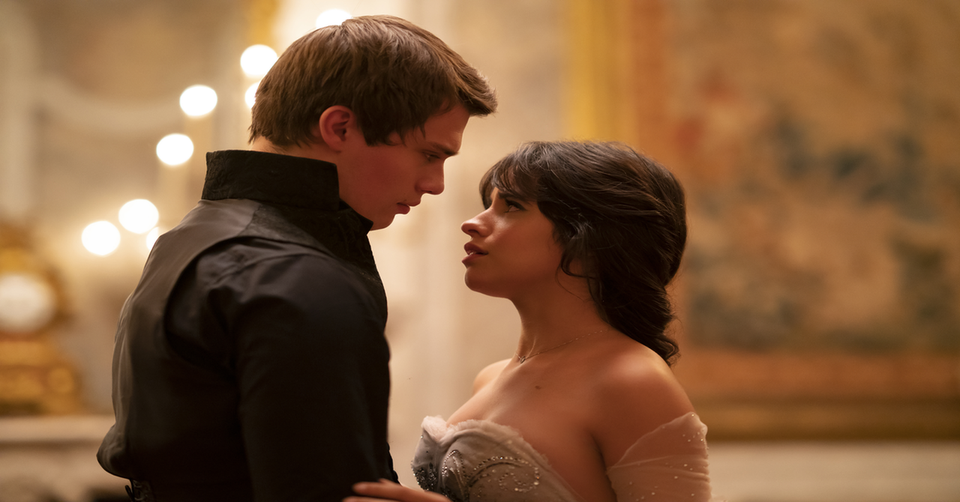4 Things Parents Should Know about Amazon's Cinderella

For centuries, the tale of Cinderella has been told and retold by various cultures around the world. It’s a story that has traditionally spoken on the power of kindness, hard work, character, hope, and wrongs being righted; it has been made, remade, rebooted, and re-envisioned on the page, on the stage, and on the silver screen more times than we can count.
With its jukebox-inspired pop soundtrack, contemporary themes and humor, and vocal talents of leading lady, pop singer Camilla Cabello, Amazon Studios’ latest adaptation of Cinderella (PG), available on Amazon Prime, seeks to shine as a more vibrant, upbeat Cinderella. However, despite its stellar cast and catchy tunes, Cinderella inevitably fails to stand tall on its own two feet, tripping over its attempt to refashion a classic tale with modern messaging and pop overtones that do more to shatter rather than celebrate Cinderella’s famed glass slippers.
Here are four things parents should know about Amazon’s Cinderella.
1. Cinderella Is a Musical, But Not in the Traditional Sense
Many Cinderella adaptations have brought life to the classic tale through song and dance. However, while many on stage and on-screen versions of the Cinderella story have incorporated original songs and ballads to help tell the story of the little cinder girl, Amazon’s Cinderella turns to the jukebox of pop hits from the last forty years to try and sell Cinderella as a more modern, hip, and “empowered” princess, no doubt to win over its target teen girl audience.
Needless to say, with characters breaking into covers of Jennifer’s Lopez’s “Let’s Get Loud,” The White Stripes’ “Seven Nation Army,” and Salt-n-Pepa’s “Whatta Man,” Amazon’s Cinderella is NOT Disney or Rogers and Hammerstein’s Cinderella, nor does it try to be.
Naturally, some songs are more appropriate and woven into the story better than others. For example, there is a certain charm and even humor to Prince Robert (Nicholas Galitzine) breaking into a rendition of Queen’s “Somebody to Love” as he prepares for the royal ball, or Cinderella’s stepmother Vivian (Idina Menzel) coaching her daughters on the necessity of marrying a wealthy man to Madonna’s “Material Girl.” Furthermore, the recent go-to wedding song, Ed Sheeran’s “Perfect,” is more than “perfect” as a love duet between Cinderella (Camilla Cabello) and Prince Robert during their first dance.
While many of Cinderella’s songs are catchy covers of well-known songs, the lack of original music, the exception being Camilla Cabello’s “A Million to One,” makes the whole movie feel more like an assembly of music videos than a cohesive story with songs crafted to serve each character or further the plot.
2. It Has a Talented but Often Underutilized Cast
It has never been a foregone conclusion that a talented cast will be enough to save a mediocre script or misguided production. Sadly, this is true of Amazon’s Cinderella.
From Idina Menzel (Frozen, Wicked) as Cinderella’s stepmother and Billy Porter (Kinky Boots, Pose) as the Fabulous Godmother, to James Corden (Into the Woods, Peter Rabbit) as one of Cinderella’s mice and Pierce Brosnan (James Bond) and Minnie Driver (Good Will Hunting) as King Rowan and Queen Beatrice, there should be enough talent on paper to attract most viewers. However, none of the big names and heavy hitters are given a real chance to shine or showcase their vocal talents except for Billy Porter, whose role is limited to one scene.
And while Camilla Cabello, known for pop hits like “Havanna,” “Never Be the Same,” and “Senorita,” is commendable in her feature film debut, her character is a mostly flat, generic protagonist. Her role is mainly subservient to the musical spectacle and contemporary messages the filmmakers are hoping to convey.

Photo credit: © Getty Images/fergregory
3. It Hints at the Importance of Hope, Relationships, and Second Chances
Viewers of Amazon’s Cinderella shouldn’t expect much in the way of a fresh, original take on a classic tale. Though it tries to say something about current issues, in the end, this Cinderella ends up saying very little as most of the same elements from the classic tale are present in this adaptation as well.
In Amazon’s Cinderella, we find an assertive, kind-hearted orphan girl, a charming but naïve prince, a somewhat prickly stepmother, a royal ball, glass slippers, and a fairy, or in this case, “fabulous” godmother (more on this in a moment). Cabello’s Cinderella is a hard-working, aspiring fashion designer who wants to make a name for herself in the world. Buried in the basement of her stepmother’s home, Cinderella dreams of using her talents for good and showing the world what she can do. Unfortunately, like most versions of the character, Cinderella is constricted by the whims of her semi-wicked stepmother (this version is far less cruel). And yet, instead of falling into despair or giving up all hope, Cinderella continues to dream (and sing) of a better future; and she is eager to share her talents with the world. In this way, there is something to be said about Cinderella’s persistence, passion, and ability to find the good in any situation, not to mention holding onto hope even in her darkest days (Proverbs 13:12). Though Cinderella’s goals are not overtly stated as God-inspired, pursuing a God-directed goal and using the talents He has given us with both confidence and joy is something young viewers should be encouraged by.
Furthermore, as a character, Cinderella has always stood out for her genuine sense of optimism, kindness, and goodness even when others have not been very good or kind to her. Despite a lifetime of being relegated to her stepmother’s basement, Cinderella never seeks retribution against her stepmother and never complains about how unfair life has been (even when it is). Cinderella also reminds viewers that true character and integrity cannot be faked. Cinderella is as kind and compassionate in her stepmother’s basement as she is at the ball. Her true personality is not conditional to her surroundings or who is watching.
Lastly, Amazon’s Cinderella speaks to the power of forgiveness and second chances. As noted, Cinderella decides to show grace and compassion to her stepmother at the end of the film instead of retribution; and King Rowan must also ask for forgiveness from his wife for placing his legacy and goals as king above his marriage. In the end, however, quite a few mixed messages are being communicated in the film that is worth addressing.
4. Cinderella Seeks to Modernize a Classic Tale with Contemporary Themes, Often to a Fault
The basic plot of Amazon’s Cinderella sticks pretty close to the traditional script. However, the injection of several contemporary themes threatens to undermine, even discard, what works so well in the classic tale. Female empowerment is the driving theme of Amazon’s Cinderella, which seems to exist as merely a megaphone for writer/director Kay Cannon’s personal views. Of course, the question parents will need to ask going in is: do Cinderella’s views align with the Biblical view of careers, callings, relationships, and marriage?
There’s a lot to discuss. For one thing, while Prince Robert’s eventual decision to relinquish his claim to the throne to support Cinderella is widely treated as selfless and supportive, the film makes no illusions about the fact that Cinderella would never (and should never) abandon her dreams and goals for him. In fact, at the royal ball, Cinderella concludes that she does not want a life with Robert if that means having to give up her own fashion career. Similarly, we learn that Cinderella’s stepmother Vivian once dreamed of being a world-famous pianist and even attended a prestigious conservatory when she was young. However, at her husband’s request (or demand), Vivian was forced to abandon her dream to raise their children. She has been bitter and cynical ever since, hence her iconic disposition.
Goals change, priorities do shift, and many husbands and wives, not to mention parents, willingly make sacrifices for their families that sometimes include them setting aside their own goals and dreams. There is nothing wrong with this either. In fact, it is commendable, even Biblical. And we know that God also has a way of reorienting our goals to align with His. However, when faced with the choice of marrying Prince Robert, Cinderella clearly defines the relationship, saying, “if it’s a choice, I choose me.” Naturally, throwing everything away for someone you’ve just met is worthy of at least some criticism, if not humor. Contemporary princess stories have begun to make light of past princess tropes. However, as Cinderella sings earlier in the film about her desire for everyone to “know her name,” we have to wonder if the intrepid designer is motivated more by fame, personal success, and her image and interests than anything else.
Also, when Cinderella’s mice friends are transformed to serve as her coachmen, Cinderella states that she assumed they were always girls. When asked why she would make that assumption, she replies, “everyone knows that all girls are mice, and all boys are rats.” There are obviously few ways to interpret this, but given several additional scenes involving male characters, it seems like a cheap joke and a not-so-subtle dig at men.

Photo credit: ©Amazon Content Services/Kerry Brown
Of course, the most prominent feature that will certainly spark conversation and controversy with many parents is the casting of actor Billy Porter as the “fabulous” godmother. Make no mistake, Billy Porter is an insanely talented actor, dancer, and singer and has one of the few showstopping numbers in the entire movie. His scene with Cinderella is also hilarious in places. For example, when Cinderella asks if he can make her glass slippers a little more comfortable, the fabulous godmother replies, “No! Women’s shoes are as they are. Even magic has limits.” This is sure to get a laugh from any woman who’s had to endure a long day in high heels. This is also not the first time a man has taken over the godmother role. In Andy Tennant’s 1998 Cinderella adaptation Ever After, Leonardo DaVinci (Patrick Godfrey) was made the mentor in Cinderella’s life; and in that version, the gender/character switch worked incredibly well. However, Leonardo DaVinci wasn’t masquerading as a female or calling himself Cinderella’s godmother. He was an entirely different, definitively male character. Though a suitable fulfillment of the mentor archetype, with Billy Porter as the fabulous godmother, a highly effeminate male acts, dresses, and performs as a female in a traditionally female role. He even calls himself her godmother. And even though men in drag have been a part of Hollywood movies for decades (Some Like it Hot, Tootsie, Mrs. Doubtfire), the humor in these instances is derived from obvious men failing in their attempts to hide/masquerade as women. With Billy Porter, the line between masculine and feminine, male and female, is intentionally blurred. Yes, it is important to distinguish between the views of the artist and the character. However, in this instance, it seems Billy Porter’s personal views of gender and sexuality are one with the character.
Ultimately, parents should be aware of what is being presented as normal and acceptable, be discerning and informed about the Biblical view of gender, marriage, and sexuality, and be prepared to instruct their children in the ways of God when the world has a very different message to deliver. In the end, Cinderella is a story we’ve seen a thousand times before. Though it tries to refashion and revive the Cinderella narrative with new music and modern themes, sometimes it’s best to respect traditional themes and leave a classic alone. Fun, entertaining, and predictable in places, it might be okay not to try this Cinderella on for size. I’m not entirely sure whose foot it’s designed to fit anyway.
Amazon’s Cinderella earns its PG rating for suggestive material and language.
Photo credit: ©EPK.TV/Amazon Studios

Originally published September 09, 2021.




